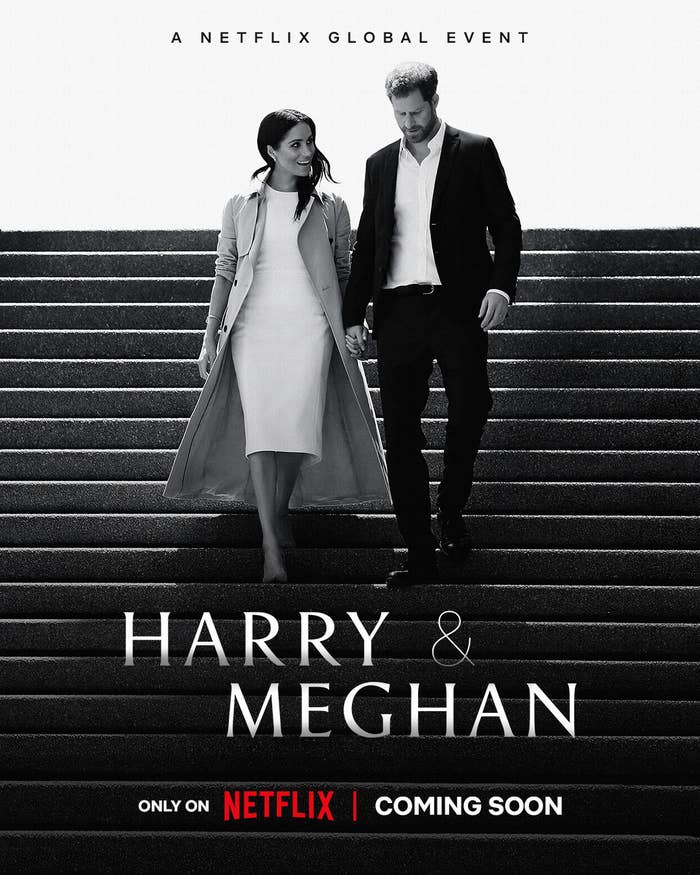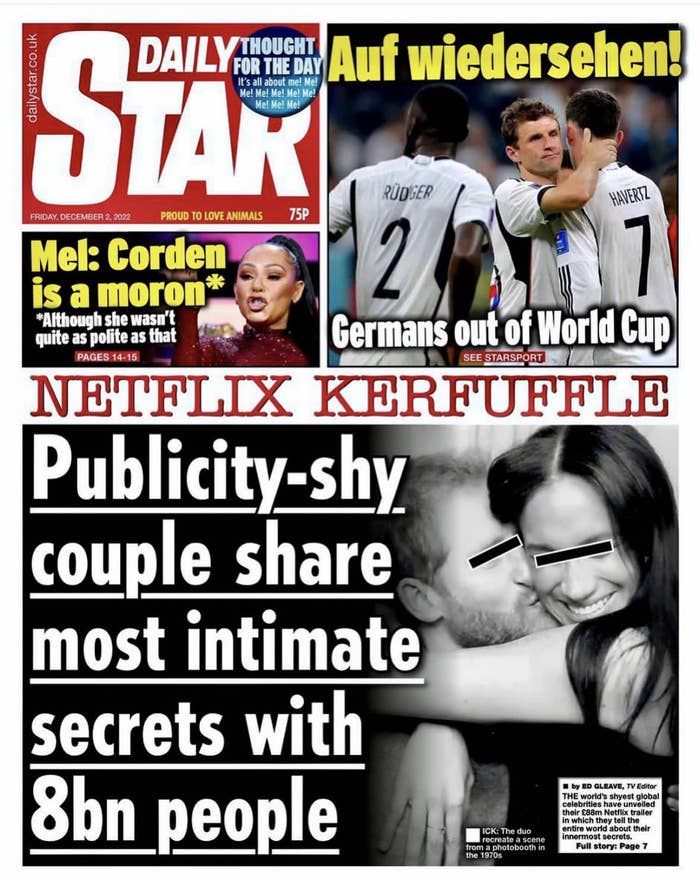
After months of speculation, Netflix dropped the teaser trailer for its behind-the-scenes documentary about Prince Harry and Meghan, the Duke and Duchess of Sussex, on Thursday. The six-episode series, simply titled Harry & Meghan and described as a “Netflix global event,” will hit the streaming platform on Dec. 8. If the clip — which contains never-before-seen photos of the couple, including multiple images of the duchess formerly known as Meghan Markle in tears — are any indication, it’s going to be a bombshell intimate look at the lives of two of the most famous people in the world.
It didn’t take long for the couple’s legions of critics to begin attacking — and it took even less time for an inevitable common theme to emerge from all of the negative feedback.
Noted Harry and Meghan hater Piers Morgan led the way, slamming the Sussexes for “bleating about privacy then doing a kiss-and-tell reality series about your private lives.” Royal biographer and commentator Angela Levin (who was recently under fire for a racist tweet about Meghan’s skin color) chimed in, asking, “Aren't we invading their privacy with these photos?” The comments section of the Daily Mail article about the docuseries echoed the same sentiment, with posts like “How’s that privacy thing going?” and “It’s amazing how quiet and personal their life is now. Definitely out of the public eye… NOT!!!!” receiving more than 7,000 upvotes. Friday’s UK papers hammered the couple for their apparent hypocrisy.
The “Harry and Meghan left royal life for privacy” narrative isn’t anything new — it’s been one of the most-repeated criticisms of Harry and Meghan since they began their new lives.
There’s just one problem: It’s not true.
The Sussexes have never said that they wanted to be “left alone.” They’ve never listed a desire for privacy as one of the reasons why they left official royal life, or even as one of the reasons why they moved from the UK to the US. And yet with every public appearance they make and family photo they release to mark a special occasion, the pearl-clutching public inevitably howls, “BUT WHAT ABOUT THEIR PRIVACY?!?”

The real question people should be asking is, “Where did the idea that the Sussexes wanted more privacy come from?” Because even from the moment they announced their plan to step back as working members of the royal family in January 2020, the word is nowhere to be seen. (Check for yourself! The words “privacy” and “private” are notably missing from the @SussexRoyal Instagram post that broke the news.)
Indeed, the website that Harry and Meghan created to lay out their proposed (and ultimately rejected) plan to continue as self-funded working royals noted their understanding and acceptance of the public’s interest in their lives: “[The Sussexes] recognise that their roles as members of the royal family are subject to interest, and they welcome accurate and honest media reporting as well as being held to account if appropriate. Equally, like every member of society, they also value privacy as individuals and as a family.”
Queen Elizabeth II’s official statement that announced the end of the so-called #Megxit negotiations on Jan. 18, 2020, made this even more clear, noting that the Sussexes sought a “happy and peaceful” and “more independent” life — not a more private one.
Meghan explicitly refuted “that privacy thing,” as the Daily Mail commentator so eloquently put it, in her interview with Oprah Winfrey, albeit in an unaired clip that was released after the special aired. She also blamed the media for its dissemination into the public’s wider consciousness. "They've created a false narrative. I've never talked about privacy," she said.
In the clip, the duchess emphasized that she and Harry only want the same basic right to privacy as anyone would expect to be given — only sharing those parts of their lives that they feel “comfortable” with sharing.
“There's no one who's on Instagram or social media that would say, 'Because I shared this one picture, that entitles you to have my entire camera roll. Go ahead and look through it,'” she says. “No one would want that. So it's about boundaries. And it's about respect."
VIDEO: Meghan, the Duchess of Sussex, tells Oprah Winfrey that the idea that she and Prince Harry left official royal life for "privacy" is a "false narrative" created by the press.
So you see, for the Sussexes, it’s never been about privacy — they’ve never wanted to step out of the spotlight. They’ve just wanted control over where it points.
As working members of the royal family, Harry and Meghan were powerless in many ways when it came to shaping their public narrative. As we know from the Oprah interview, they had to play the media game according to the royal family’s rules, staying silent when they would’ve rather spoken out. They were obligated to share parts of their lives with the public via an established system of Palace-approved reporters known as the “royal rota” and compelled to participate in such rituals as the ceremonial presenting of the royal baby to the cameras. They had to seek approval for everything, always with the understanding that their wants and needs were of lesser importance than those of the sovereign and direct heirs to the throne — not to mention the preservation of the monarchy. (Indeed, Meghan told Oprah that the top royal bureaucrats “were willing to lie to protect other members of the family, but they weren’t willing to tell the truth to protect me and my husband.”)
Outside of the royal system, the Sussexes can do what they want. They have the ability to, as Meghan referenced, choose one photo from the camera roll to share with the world — without consultation or approval from a higher power. And that’s what they’re doing with the Harry & Meghan Netflix docuseries.
The Sussexes aren’t just the subjects of the show. They produced it. You can draw your own conclusions about how much control they had over the finished product. (Meghan made a point of distancing her husband and herself from the process in a recent Variety interview.) But let’s be serious here. There’s absolutely no world in which they’re going to be unhappy with the docuseries when it starts streaming next week. There’s no way they haven’t seen it and given it their seal of approval. They’ve had control over it from start to finish.
And that control over the narrative is what they’ve always wanted.
One of the first things they did upon officially leaving royal life was settle scores — they famously cut off those UK tabloids they felt had covered them unfairly (and abusively) during their time as working royals.
Since then, the Sussexes have wielded their newfound power over the public’s perception of their lives with an iron fist. The select number of chosen outlets that have been granted interviews with the couple have been conducted by, for the most part, questioners who declined to challenge them on anything. Harry told the story of his mental health journey in a docuseries he coproduced with Oprah for Apple+ titled The Me You Can’t See (and, as I noted at the time, the version of his life he told was slightly different from what he’s said about his life in the past.)
But Harry & Meghan is the first time that the Sussexes will be able to tell their story from beginning to end, entirely in their own words. They’ll finally be able to make their case to the public and “correct the record” as they were unable to do when it was actually happening.
“When the stakes are this high, doesn’t it make more sense to hear our story from us?” Meghan asks in the docuseries trailer.
The stakes are high indeed. Let’s see what the Sussexes do with this total control of their narrative.
